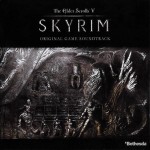We were recently impressed with Jeremy Soule’s new direction with Order of War last month, but I admit that my favorite works of his are still Morrowind, Oblivion, and Guild Wars: Eye of the North. In that sense, his score for IL-2 Sturmovik really hits the spot, coming as a compromise between epic fantasy and that “World War II sound” that has become all too common with seemingly endless stream of games that focuses on that particular war.
What exactly does that mean? Well, there are sweeping moments that sound like they’re out of Oblivion or Morrowind, intense action cues, and even true “classical” moments like those heard in Eye of the North, but all of these are experienced through the distinct lens of World War II. As impressed as I was with the new direction in Order of War, I’m even more impressed with IL-2 Sturmovik for being downright great with amazing melodies, atmospheres, and true hints of classical music that I think are missing from games. I think I have a new favorite release from DirectSong with this one.
Read our review of what I think is one of Jeremy Soule’s greatest soundtracks to date after the jump.
“IL-2 Sturmovik March” gets things moving on a positive note, opening with a triumphant trumpet melody that is later reinforced by an upbeat string progression and bombastic orchestral percussion. The melody is memorable, but isn’t so over the top as to turn me off like most World War II game “main themes,” and quite honestly, Soule’s main themes for both Morrowind and Oblivion did.
“The Engagement” gets us up into the clouds with its airy brass melody, epic choral work, and string stabs that drive home tension, but lift slightly during an angelic chorus section that acts as a nice pause between heavier sections on either side of it. A later track, “Chariots of Endearment” is another air combat piece that is much more powerful with its heavy use of brass, but it similarly works in fleeting moments of beauty in the form of grandiose string sections.
When I mentioned the “classical” style of Guild Wars: Eye of the North, “The Hunt” was the track I had in mind. It literally sounds like you’re listening to a piece of music that was written for full orchestra to be played in a concert hall. The melody skips along almost playfully, but there is certainly a sense of danger about it. There’s even a lovely violin solo towards the middle of the piece that I would love to hear done with a live orchestra. This is definitely one of the highlights.
“The Great Death Mistress” is another track that I feel is suited for a concert hall with its beautifully layered strings that move rapidly, combining staccato bass notes and longer notes that allow the piece to flow. “Theatre of the Delusionary,” on the other hand, is an abstract journey with a fitting title, as it moves through segments of epic conflict and majestic splendor, the latter of which I wish were just a bit longer.
Next, “Code of Honor,” sounds quite grounded with its heavy use of bass that contrasts with its sorrowful choir elements, creating an interesting conflict within the piece. There’s an amazing melody about midway through the piece that references the main theme, but literally drips with emotion, making it one of the highlights of the album. “Rain Ghosts” is equally deep, but takes on a more foreboding sound compared to the previous track’s emotional tone. Moments of silence and dissonance soak an uncertain progression that’s not memorable for its melody (it’s almost devoid of one), but rather for its intense atmosphere. This one would be great in a horror film.
One of the final tracks, “Valor and Triumph,” doesn’t sound triumphant at all. It’s actually one of the most dissonant tracks here, with seemingly multiple ideas all going on at once. A triumphant brass melody is finally layered over the top of the chaos, but I can’t say it’s the most memorable or effective way to convey triumph. That’s okay, however, as we’re not done just yet.
There are two short pieces that follow, the first of which is a lovely solo piano ballad titled “Lament for the Pilot.” This is another highlight of the album with its mournful melody that sounds like some sort of famous nocturne… but it’s Jeremy Soule! I just wish it were longer, as it’s just over a minute long. I could have gone for an entire piano concerto based on this theme. The final track, “Victory,” is every bit as positive and bombastic as one would expect. It’s 40 seconds long, but I suppose it makes a great ending piece for the album with its positive energy.
Well, I’ve found myself to be very surprised by the IL-2 Sturmovik: Birds of Prey Soundtrack. It’s one of my favorite Jeremy Soule scores to date, and that really means something coming from me, as he’s one of my favorite Western composers. There are a number of magical musical moments here, and honestly, this soundtrack and the Eye of the North soundtrack really need to hit a concert hall near you. It’s that good and that authentic. Do yourself a favor and head over to DirectSong and pick it up, as it’s now available.
Are you a fan of Jeremy Soule’s “concert piece” approach with some of his recent soundtracks? Are you surprised to hear another World War II-based soundtrack from him so soon?
Tags: Classical, DirectSong, Flight Simulator, IL-2 Sturmovik: Birds of Prey, Jeremy Soule, Music Reviews, Orchestral, Reviews








































